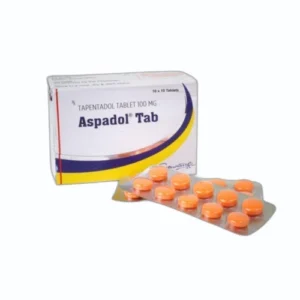Aspadol

What is Aspadol?
Aspadol is a brand of Tapentadol, a centrally acting opioid pain reliever manufactured by HAB Pharmaceuticals(India). It is prescribed for the treatment of moderate to severe acute or chronic pain, especially when other painkillers are not sufficient.
Tapentadol is unique because it has a dual mechanism of action: it works both as an opioid receptor agonist and as a norepinephrine reuptake inhibitor (NRI), making it effective in controlling different types of pain, including neuropathic pain.
Uses of Aspadol
Aspadol (Tapentadol) is used for:
-
Moderate to severe acute pain (post-surgical pain, injury, trauma).
-
Chronic pain management (e.g., osteoarthritis, lower back pain).
-
Neuropathic pain in diabetic patients (when nerve damage causes persistent pain).
Dosage Information
-
Available Strengths (Tags): 50 mg, 75 mg, 100 mg tablets.
-
Typical Adult Dose:
-
50–100 mg every 4–6 hours depending on pain severity.
-
Maximum daily dose should not exceed 500 mg/day.
-
-
Formulations: Available in immediate-release (IR) and extended-release (ER) tablets.
-
Should be swallowed whole with water; not crushed or chewed.
⚠️ Aspadol should be taken only under medical supervision due to its opioid nature.
How Does Aspadol Work?
Tapentadol, the active ingredient in Aspadol, has a dual mode of action:
-
Opioid receptor agonist → Binds to µ-opioid receptors in the brain to reduce pain signals.
-
Norepinephrine reuptake inhibitor (NRI) → Increases norepinephrine levels in the nervous system, enhancing pain inhibition pathways.
This combination makes Aspadol effective for both nociceptive pain (injury-related) and neuropathic pain (nerve-related).
Side Effects of Aspadol
Common Side Effects
-
Nausea, vomiting
-
Drowsiness, dizziness
-
Constipation
-
Headache
Less Common but Possible
-
Dry mouth
-
Sweating
-
Loss of appetite
Serious Side Effects (Seek Medical Help)
-
Breathing problems (respiratory depression)
-
Severe low blood pressure
-
Seizures
-
Risk of misuse, addiction, or withdrawal symptoms
Warnings & Precautions
-
Addiction Risk: Aspadol is an opioid and can cause dependence or abuse if not taken as directed.
-
Respiratory Risk: Should not be used in patients with severe breathing problems or uncontrolled asthma.
-
Medical Conditions: Caution in patients with liver/kidney problems, head injuries, or seizure disorders.
-
Alcohol Warning: Avoid alcohol, as it increases risk of sedation and breathing issues.
-
Age Restrictions: Not recommended for children.
Drug Interactions
Aspadol (Tapentadol) may interact with:
-
Other opioids (morphine, tramadol, codeine)
-
Antidepressants (SSRIs, SNRIs, MAO inhibitors – risk of serotonin syndrome)
-
Sleeping pills, sedatives, or alcohol
-
Certain anti-seizure medicines
Manufacturer Information
-
Aspadol is manufactured by HAB Pharmaceuticals & Research Ltd.
-
Tapentadol is also available globally under different brand names (e.g., Nucynta in the U.S. by Janssen Pharmaceuticals).
Frequently Asked Questions (FAQs)
Q1. Is Aspadol the same as Tramadol?
No. While both are painkillers, Tapentadol (Aspadol) is stronger and faster-acting than Tramadol.
Q2. How long does Aspadol take to work?
Relief usually begins within 30 minutes of oral administration and lasts 4–6 hours for immediate-release tablets.
Q3. Is Aspadol safe for long-term use?
Long-term use is generally not recommended due to dependence risk. Extended-release formulations may be prescribed for chronic pain, but always under strict medical supervision.
Q4. Can Aspadol be stopped suddenly?
No. Abrupt discontinuation can cause withdrawal symptoms (anxiety, sweating, restlessness). Tapering under a doctor’s guidance is necessary.
Key Takeaway
Aspadol (Tapentadol) is an effective opioid painkiller for moderate to severe pain, especially when standard analgesics are not enough. While powerful, it carries risks of dependence, respiratory issues, and interactions, so it should be used only under medical advice.
